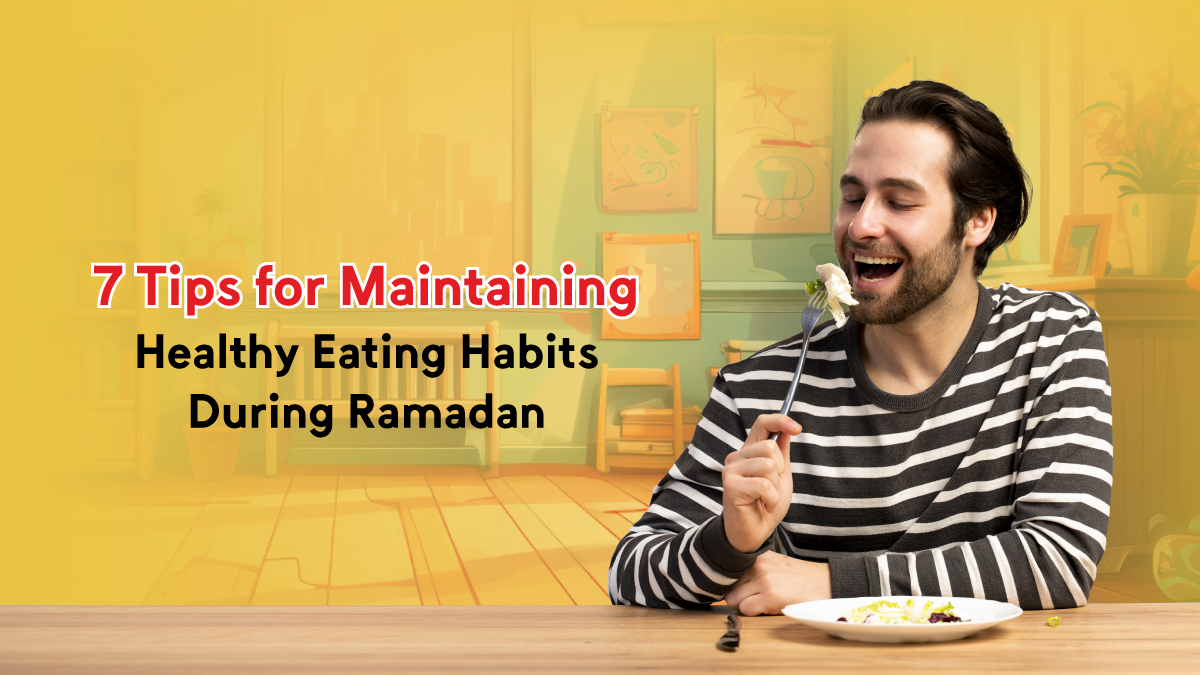
Ramadan is a sacred month observed by Muslims worldwide, marked by fasting from dawn till sunset. While fasting during Ramadan holds significant spiritual importance, it can also pose challenges to maintaining healthy eating habits. However, with mindful choices and strategic planning, it’s entirely possible to uphold a nutritious diet during this holy month.
Healthy Eating Habits During Ramadan
Maintaining healthy eating habits during Ramadan is essential for individuals observing this sacred month of fasting. With the daily fast extending from dawn till sunset, it’s crucial to make mindful choices when it comes to suhoor and iftar meals.
Starting the day with a balanced suhoor that includes complex carbohydrates, protein-rich foods, and hydrating fruits ensures sustained energy levels throughout the fasting hours. During iftar, breaking the fast with nutrient-dense foods such as lean proteins, whole grains, and vegetables replenishes nutrients and promotes satiety.
By prioritizing healthy eating habits during Ramadan, individuals can optimize their physical well-being and spiritual experience during this holy time.
Here are seven tips to help you navigate healthy eating habits during Ramadan.
-
Start with a Balanced Suhoor
Suhoor, the pre-dawn meal before fasting begins, is crucial for sustaining energy levels throughout the day. Opt for a balanced meal that includes complex carbohydrates, protein, healthy fats, and fiber-rich foods. Incorporate whole grains like oats or whole wheat bread, lean protein sources such as eggs or Greek yogurt, and fruits and vegetables for essential vitamins and minerals. Avoid sugary or processed foods that can cause energy crashes later in the day.
-
Stay Hydrated Throughout the Night
Hydration is key, especially during the long hours of fasting. Make sure to drink plenty of water during non-fasting hours, particularly in the evening and early morning. Coconut water, herbal teas, and hydrating fruits like watermelon or cucumbers can also contribute to your fluid intake. Limit caffeinated and sugary beverages, as they can lead to dehydration.
-
Choose Nutrient-Dense Foods for Iftar
Breaking your fast with a nutritious meal is essential for replenishing energy and nutrients. Opt for nutrient-dense foods that provide sustained energy and promote satiety. Include a variety of food groups such as lean proteins, whole grains, legumes, and vegetables. Avoid heavy, fried foods and excessive sugary treats, which can lead to digestive discomfort and energy crashes.
-
Practice Portion Control
During Ramadan, it’s easy to indulge in large meals after a day of fasting. However, practicing portion control is vital for maintaining healthy eating habits. Be mindful of serving sizes and listen to your body’s hunger cues. Eating slowly and savoring each bite can help prevent overeating and promote better digestion.
-
Include Physical Activity
While fasting, incorporating light physical activity can help maintain metabolism and energy levels. Engage in activities such as walking, yoga, or gentle stretching during non-fasting hours. Avoid strenuous exercise during peak fasting times to prevent dehydration and fatigue. Remember to listen to your body and adjust the intensity of your workouts accordingly.
-
Focus on Quality Sleep
Adequate sleep is crucial for overall health and well-being, especially during Ramadan. Aim for quality sleep by establishing a consistent bedtime routine and creating a conducive sleep environment. Limit exposure to screens and electronic devices before bed, and practice relaxation techniques such as deep breathing or meditation to promote restful sleep.
-
Seek Professional Guidance
If you have specific dietary concerns or health conditions, consider consulting a registered dietitian or nutritionist for personalized guidance. They can provide tailored recommendations to help you meet your nutritional needs while fasting during Ramadan. Additionally, they can offer support and advice for managing any health issues or dietary restrictions effectively.
Consulting with a healthcare professional or nutritionist can provide personalized guidance on maintaining healthy eating habits during Ramadan, especially for individuals with specific dietary needs or health conditions.
By incorporating these seven tips into your Ramadan routine, you can maintain healthy eating habits while honoring the spiritual significance of fasting. Remember to prioritize nutrient-rich foods, stay hydrated, and listen to your body’s needs throughout the month. With mindful choices and moderation, you can enjoy a nourishing and fulfilling Ramadan experience.
healthy food for Ramadan fasting
Choosing healthy food for Ramadan fasting is paramount for individuals looking to maintain their well-being and energy levels throughout the day. During the pre-dawn meal, known as suhoor, it’s essential to opt for nutrient-rich options that provide sustained energy during the fasting hours.
Incorporating foods high in complex carbohydrates, lean proteins, healthy fats, and fiber ensures a balanced meal that keeps hunger at bay. Whole grains like oats or whole wheat bread, along with protein sources such as eggs or Greek yogurt, provide lasting satiety, while fruits and vegetables offer essential vitamins and minerals.
Additionally, hydrating foods like watermelon or cucumbers contribute to overall hydration, helping individuals stay energized throughout the day. By prioritizing healthy food for Ramadan fasting, individuals can nourish their bodies and sustain their fast with ease and vitality.
Maintaining healthy eating habits during Ramadan is essential for sustaining energy levels throughout the day while fasting.
Healthy Ramadan Recipes
Exploring Healthy Ramadan Recipes can be an exciting and rewarding endeavor for individuals seeking nutritious and delicious options during the fasting month. With a focus on wholesome ingredients and balanced flavors, these recipes offer a variety of dishes that cater to different tastes and dietary preferences. From hearty salads packed with leafy greens, protein-rich legumes, and vibrant vegetables to flavorful soups brimming with spices and aromatics, there’s no shortage of nutritious options to choose from.
Incorporating lean proteins like grilled chicken or fish, whole grains such as quinoa or brown rice, and plenty of fresh herbs and spices adds depth and complexity to these dishes. Whether it’s a refreshing fruit salad for suhoor or a comforting lentil soup for iftar, Healthy Ramadan Recipes ensure that individuals can enjoy nourishing meals while honoring their fasting tradition.
Adopting healthy eating habits during Ramadan promotes physical well-being and enhances spiritual practices.
Unique FAQs
- Can I exercise during Ramadan while fasting?
Yes, you can engage in light to moderate exercise during Ramadan, but it’s essential to listen to your body and avoid overexertion, especially during fasting hours.
- How can I stay hydrated while fasting?
Focus on drinking plenty of water between Iftar and Suhoor, and include hydrating foods such as fruits and vegetables in your meals.
- Are there specific foods I should avoid during Ramadan?
Try to limit your intake of fried and sugary foods, opting instead for nutrient-rich, whole foods that nourish your body and support overall health.
- What should I do if I feel hungry or thirsty while fasting?
Focus on staying hydrated and consuming balanced meals during Suhoor and Iftar to help manage hunger and thirst throughout the day.
- How can I ensure I’m getting enough nutrients during Ramadan?
Plan your meals carefully to include a variety of food groups, focusing on nutrient-dense foods that provide essential vitamins, minerals, and antioxidants.
- Why are healthy eating habits important during Ramadan?
Answer: Healthy eating habits during Ramadan are important for maintaining physical well-being, sustaining energy levels throughout the day, and supporting overall health during the fasting period.
- How can individuals address specific dietary needs or health conditions while maintaining healthy eating habits during Ramadan?
Answer: Individuals can address specific dietary needs or health conditions during Ramadan by consulting with a healthcare professional or registered dietitian for personalized recommendations and guidance on adapting their diet to meet their nutritional requirements while fasting.
Conclusion
In conclusion, observing healthy eating habits during Ramadan is not only feasible but also essential for maintaining overall well-being and energy levels throughout the month. By following the seven tips outlined above, including balanced suhoor and iftar meals, staying hydrated, practicing portion control, incorporating physical activity, prioritizing quality sleep, and seeking professional guidance when needed, you can navigate this sacred period with ease and vitality.
Remember, Ramadan is a time for spiritual reflection and renewal, and taking care of your body through mindful nutrition and self-care practices enhances the experience. Embrace these tips to make the most out of your Ramadan journey and enjoy the blessings of this holy month to the fullest. Adopting healthy eating habits during Ramadan promotes physical well-being and enhances spiritual practices.















